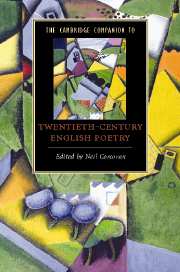Book contents
- Frontmatter
- Introduction
- Part I Contexts
- Part II Moderns
- Part III Modernists
- Part IV Later Modernities
- 10 Philip Larkin: a late modern poet
- 11 R. S. Thomas and modern Welsh poetry
- 12 Gender, feminism, poetry: Stevie Smith, Sylvia Plath, Jo Shapcott
- 13 Varieties of poetic sequence: Ted Hughes and Geoffrey Hill
- 14 Black British poetry and the translocal
- 15 Poetry and class: Tony Harrison, Peter Reading, Ken Smith, Sean O’Brien
- 16 A Scottish Renaissance: Edwin Morgan, Douglas Dunn, Liz Lochhead, Robert Crawford, Don Paterson, Kathleen Jamie
- 17 Lyric adaptations: James Fenton, Craig Raine, Christopher Reid, Simon Armitage, Carol Ann Duffy
- Index
11 - R. S. Thomas and modern Welsh poetry
from Part IV - Later Modernities
Published online by Cambridge University Press: 28 January 2008
- Frontmatter
- Introduction
- Part I Contexts
- Part II Moderns
- Part III Modernists
- Part IV Later Modernities
- 10 Philip Larkin: a late modern poet
- 11 R. S. Thomas and modern Welsh poetry
- 12 Gender, feminism, poetry: Stevie Smith, Sylvia Plath, Jo Shapcott
- 13 Varieties of poetic sequence: Ted Hughes and Geoffrey Hill
- 14 Black British poetry and the translocal
- 15 Poetry and class: Tony Harrison, Peter Reading, Ken Smith, Sean O’Brien
- 16 A Scottish Renaissance: Edwin Morgan, Douglas Dunn, Liz Lochhead, Robert Crawford, Don Paterson, Kathleen Jamie
- 17 Lyric adaptations: James Fenton, Craig Raine, Christopher Reid, Simon Armitage, Carol Ann Duffy
- Index
Summary
In The Unbearable Lightness of Being in Aberystwyth, a zany noir spoof of Raymond Chandler, Malcolm Pryce has his private eye, Louie Knight, buy a ticket to Nantyronen that includes 'admission to the Iago Prytherch “home-stay”'. Having reached his destination, he is guided by signs such as 'You are now entering Iago Prytherch Country' and 'The bald Welsh hills' to the hovel ('Warning: spittled mirth') where Iago himself huddles. Parody of this order is an inverted tribute to the power of the early R. S. Thomas to recreate the human and physical landscape of rural, upland Wales in the very image of his own obsession. He gave that obsession a name, Iago Prytherch, and a local habitation, Prytherch country, as broodingly mapped as Faulkner's Yoknapatawpha County.
If Dylan Thomas was the definitive poetic talent of pre-Second World War Wales, then it was this other Thomas, culturally, politically and poetically his polar opposite, who became the defining poetic talent of post-war decades. It is therefore with a shock that one realises that R. S., who fully blossomed only after Dylan's death in 1953, was in fact a year older than his namesake. But whereas the quintessential South Walian was a prodigy, who had completed a corpus of remarkable lyrics by the age of eighteen, the North Walian was by his own admission a late developer, both as a poet and as a man, an emotional retardation he blamed on his snobbishly genteel mother's possessiveness. And while his poetic development was impeded by his lingering attachment to the variously Romantic poems in Palgrave's Golden Treasury, he saw it, too, as ultimately deriving from the immature sensibility cultivated in him by her. Iago was therefore the tutelary spirit not only of a breakthrough poetry but also of a personal maturation that took the form of a narcissistic adult's belated encounter with the Reality Principle.
- Type
- Chapter
- Information
- The Cambridge Companion to Twentieth-Century English Poetry , pp. 159 - 172Publisher: Cambridge University PressPrint publication year: 2007
- 1
- Cited by

